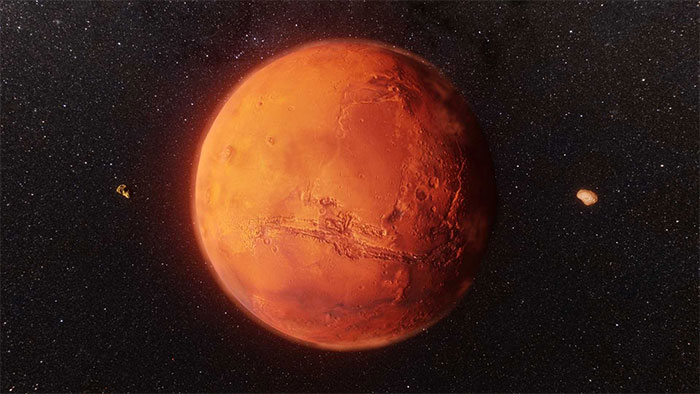Mars' Surprising Effect on Earth's Oceans
Although Mars may be some 225 million kilometers away from Earth, the planet is already affecting the climate where humans live, according to new research.
Geological evidence dating back more than 65 million years and taken from hundreds of sites around the world shows that deep-sea ocean currents have repeatedly gone through periods of strength and weakness, a phenomenon known as the ' grand astronomical cycle' every 2.4 million years, according to research published on March 12 in the journal Nature Communications.

Mars.
More powerful currents, called giant whirlpools or eddies, can reach the deepest seafloor known as the oceanic abyss . These powerful currents then erode large patches of sediment that accumulate during more stable periods in the cycle. Research also suggests that these cycles coincide with gravitational interactions between Earth and Mars as the two planets orbit the Sun.
"The gravitational fields of the planets in the solar system interfere with each other and this interaction is called resonance , which changes the planets' eccentricities and their orbits," said study co-author Professor of Geophysics Dietmar Müller.
Because of this resonance, Earth was pulled slightly closer to the Sun by Mars' gravity, meaning our planet was exposed to more solar radiation and would have had a warmer climate, before drifting back 2.4 million years later.
The authors of the new study used satellite data to map the accumulation of sediment on the ocean floor over tens of millions of years. They found that there were gaps in the geological record where sediment stopped accumulating during these astronomical cycles. They believe this may be related to stronger ocean currents, as the weather warmed due to the gravitational pull of Mars on Earth.
These findings support the idea that, despite being hundreds of millions of years away, Mars is still influencing the climate on Earth. However, the authors also stressed in the statement that this observed warming effect is not related to global warming caused by human-caused greenhouse gas emissions.
While speculative at this stage, the findings suggest that the cycle may help maintain some deep ocean currents periodically, in the event that global warming causes them to decline.
'We know that there are at least two separate mechanisms that contribute to the strength of deep ocean mixing,' said Professor Müller . One of these mechanisms, he said, is called the Atlantic Meridional Overturning Circulation (AMOC) – the main current system in the North and South Atlantic that plays a key role in the climate system. It acts as an oceanic 'conveyor belt' , carrying warm water from the tropics to the Northern Hemisphere.
"The 65 million years of deep-sea data we have shows that warmer oceans have stronger circulation at the depths, which keeps the ocean from stagnating even when the Atlantic meridional circulation slows or stops altogether," said Adriana Dutkiewicz, lead author of the study and a sedimentologist at the University of Sydney.
- 9 surprising facts about Red planet
- People are 'killing' the oceans
- The chances of you being struck by lightning on Mars are much lower than on Earth
- Mysterious object that 'crushed' Mars discovered
- 'Mars used to have many oceans'
- Recreate the atmosphere for Mars to land
- Mars and Venus: surprising similarities
- NASA's Mars rover sends back surprising images
- Did the ocean on Mars get into the rock?
- Bad news for Elon Musk: NASA claims Mars can't be improved anymore
- There is no sea on Mars
- Does 'cause and effect' exist? Why does science also believe that cause and effect are real?
 Van Allen's belt and evidence that the Apollo 11 mission to the Moon was myth
Van Allen's belt and evidence that the Apollo 11 mission to the Moon was myth The levels of civilization in the universe (Kardashev scale)
The levels of civilization in the universe (Kardashev scale) Today Mars, the sun and the Earth are aligned
Today Mars, the sun and the Earth are aligned The Amazon owner announced a secret plan to build a space base for thousands of people
The Amazon owner announced a secret plan to build a space base for thousands of people